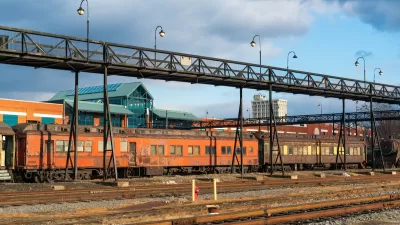Due to budget constraints, the current C train (code name: R32) will continue to serve New Yorkers until 2017, making it one of the oldest subway line in the world.
"It can be hard to imagine that when the trains were introduced in September 1964, in a ceremony at Grand Central Terminal complete with a 20-piece marching band, the R32s carried the optimistic nickname 'Brightliners' and were heralded as the most technologically advanced trains yet seen in the New York City subway," writes Michael Grynbaum for The New York Times.
While "[s]ome riders relish the retro feel of the R32, its dim taupe interiors, old-fashioned roll signs, and an unusual front window that allows an unobstructed view of the track," others think that the aging fleet is a relic from the past. A report card published by the Straphangers Campaign reveals that the "C trains break down three times as often as the average subway car, arrive only once every 10 minutes at peak periods, and have the least understandable announcements in the system." Grynbaum adds, "In a modern city that prides itself on Bloombergian efficiency, the C is a throwback."
The refurbishment cost to keep the trains running for another six years is estimated at $24 million.
FULL STORY: For the C Train’s Rickety and Rackety Cars, Retirement Will Have to Wait

Planetizen Federal Action Tracker
A weekly monitor of how Trump’s orders and actions are impacting planners and planning in America.

Maui's Vacation Rental Debate Turns Ugly
Verbal attacks, misinformation campaigns and fistfights plague a high-stakes debate to convert thousands of vacation rentals into long-term housing.

San Francisco Suspends Traffic Calming Amidst Record Deaths
Citing “a challenging fiscal landscape,” the city will cease the program on the heels of 42 traffic deaths, including 24 pedestrians.

Amtrak Rolls Out New Orleans to Alabama “Mardi Gras” Train
The new service will operate morning and evening departures between Mobile and New Orleans.

The Subversive Car-Free Guide to Trump's Great American Road Trip
Car-free ways to access Chicagoland’s best tourist attractions.

San Antonio and Austin are Fusing Into one Massive Megaregion
The region spanning the two central Texas cities is growing fast, posing challenges for local infrastructure and water supplies.
Urban Design for Planners 1: Software Tools
This six-course series explores essential urban design concepts using open source software and equips planners with the tools they need to participate fully in the urban design process.
Planning for Universal Design
Learn the tools for implementing Universal Design in planning regulations.
Heyer Gruel & Associates PA
JM Goldson LLC
Custer County Colorado
City of Camden Redevelopment Agency
City of Astoria
Transportation Research & Education Center (TREC) at Portland State University
Jefferson Parish Government
Camden Redevelopment Agency
City of Claremont





























